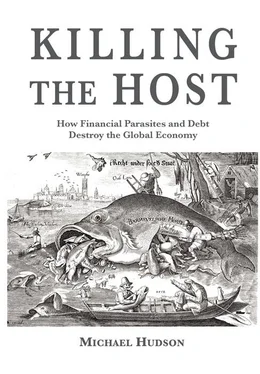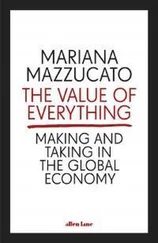To help prevent such financialization from recurring after a debt writedown, it is necessary to reform tax policy by focusing it on rent extraction and “capital” gains. Otherwise, banks and financial markets will continue to create credit mainly against land rent for real estate, natural resource rent for the oil and mining sectors, and monopoly rent for infrastructure being privatized from the public domain.
Land rent heads the list because real estate remains the largest asset in nearly every economy. As Chapter 7 has described, some 80 percent of new bank credit takes the form of mortgage loans, whose main effect is to bid up property prices. This price rise serves as poisoned bait for homebuyers (and also “activist shareholders” in the stock market) hoping to get rich by debt-leveraged “capital” gains that increase their net worth on paper.
These gains cannot be sustained if the debt creation process smothers the economy. In 2011 the U.S. housing finance agency raised its guarantee for mortgage debt service to 43 percent of family income, up from the customary 25 percent rule of thumb prior to the 1980s. Down payments were reduced in 2013 from 5 percent to just 3 percent. These looser guidelines enable families to borrow more — and housing prices rise to however much a bank will lend. But instead of elevating families into the middle class, the inflation of home prices becomes a treadmill to debt peonage. Inflating prices for rent-yielding assets creates a vested interest in expanding unproductive credit creation to prevent a collapse of asset prices leading to negative equity. This forces the economy to choose between two evils: yet more debt (“extend and pretend,” inherently short-term), or the inevitable bankruptcies and forfeitures to creditors in the end.
Classical rent theory demonstrates what seems to be counter-intuitive: Raising property taxes holds down what banks will lend, and hence the price of housing, because rent paid to the tax collector is not available to be capitalized into bank debt . But the financial sector popularizes the illusion that lower property taxes will make home ownership more affordable. Bankers know that lower taxes will leave more of the property’s rental value available for new buyers to pay interest (or existing owners to borrow against by taking out “home equity” loans). What homeowners seem to gain in property tax cuts ends up being paid in higher mortgage costs of buying homes.
Taxing land rent (and also natural resource rent and monopoly rent) has three positive effects. First, it keeps property prices low by preventing this rent from being capitalized into bank loans. Second, it frees labor and industry from taxes on wages, profits and sales, alleviating most family budgets. Third, banks will be obliged not to create as much new debt that merely becomes a cost of transferring ownership rather than contributing to real output and productivity. Taxing rent is administratively easy. The United States has over twenty thousand appraisers whose job is to assess the market value of buildings and land separately.
In the case of natural resources, oil and mining companies typically buy crude from producer countries at low prices reflecting actual production costs. Payment is made by tax-avoidance “flag of convenience” countries such as Panama or Liberia (which conveniently use the U.S. dollar), which sell the oil at a markup to refineries in the oil-consuming nations. This markup is pure resource rent, not “profit” in the classical sense. It is untaxed.
For monopolies, economic rent is revenue that cannot be explained by spending on tangible capital investment and labor. There is a long tradition of untangling the maze of fictitious cost accounting. During World War II, the U.S. Government applied this principle in its Excess Profits Tax, much as earlier regulators calculated fair-market value for railroad tariffs and other monopoly services (at least, this is what they were supposed to do). Investment bankers put “free lunch” rent rights at the top of their wish list of assets to be privatized, untaxed and deregulated, precisely because these are “cash cows,” much like lotteries and other public revenue streams.
A debt-ridden, regressively taxed economy in which fortunes are based on rent extraction, and by financial claims on the nation for interest, amortization and fees, is higher-cost than an “equity” economy basing its tax system on land rent, natural resource rent and regulating monopoly pricing. If such rentier income is unearned and hence unfair, then so are the fortunes and hereditary estates built up from such income. Fortunately, rent takings are reversible . A rent tax can recapture what privatizers and kleptocrats have taken.
At issue in today’s New Enclosure movement to privatize economic rent are two visions of capitalism: financial vs. industrial. A bubble economy’s mode of “creating wealth” by (1) debt-leveraging and (2) taxing labor and consumers rather than economic rent has made America a high-cost economy.
To be sure, if governments collect the land rent, many existing property owners will default on their payments to the banks, or will feel obliged to walk away from their property. When banks do not receive what they had set their eyes on, many will see their reserves wiped out even more dramatically than occurred 2008. An abrupt shift to taxing rents or other revenue already pledged to banks will decimate their stockholders and bondholders. Taxing rent thus will require a public takeover of such “troubled” banks. The financial sector has forced society to make a choice: either submit to turning the economy into a rentier-ridden Ponzi scheme, or subordinate the banking and tax system to the aim of financing growth. That is why reform must be across-the-board, not piecemeal.
It is hard to see how economic rent can be fully taxed without a public option for banking, because the rent to be taxed already has been earmarked to pay interest. Something must give. Being taken into the public domain is the price that banks pay for over-lending to the point where interest charges often absorb the entire economic rent and crowd out the tax collector, while forcing indebted owners to default. Under these conditions, turning insolvent banks into public institutions is the easiest alternative to financial austerity and anarchy.
3. Revoke the tax deductibility of interest
Interest is not a cost of doing business when it is paid to transfer ownership rights to existing properties or enterprises. Debt taken on simply to buy assets is pure overhead, adding to the cost of doing business. Making interest payments on such transactions tax deductible enables the One Percent to take more from industry, real estate and commerce. This perverse incentive enables industrial firms to be raided by financial tactics to pay out more to bondholders than they can to stockholders (by paying income that otherwise would be declared as taxable profit). This encourages debt leveraging rather than equity investment, especially for leveraged buyouts that add interest charges to the cost of doing business.
Tax deductibility for interest also adds to the cost of living, to the extent that it shifts the tax burden onto wage income and consumer sales. Yet politicians end up giving tax advantages to creditors because the financial sector has become their main constituency of campaign contributors.
Just as in the case of leaving economic rent untaxed, un-taxing interest payments leaves more after-tax real estate rent and corporate cash flow “free” to be capitalized into larger loans that raise asset prices for new buyers on credit. The untaxed interest ends up being paid to bankers and bondholders. This transformation of rents and tax cuts into interest — creating “capital” gains in the process — throws Wall Street’s backing behind an anti-growth tax policy whose main “product” is debt.
Читать дальше












